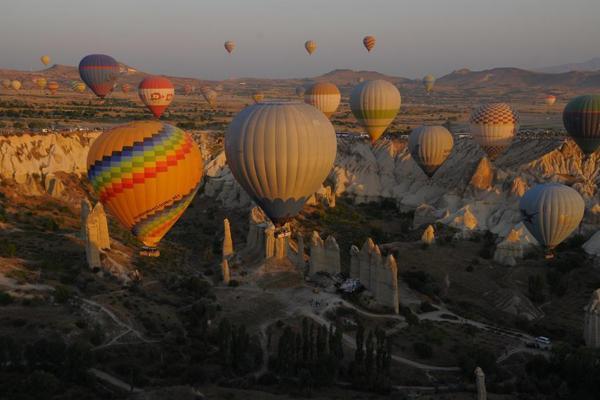Some 1.9 mln tourists visit Cappadocia
NEVŞEHİR


Some 1.89 million people have visited Cappadocia, the historical region in Central Anatolia famous for its fairy chimneys, this year, according to data from the provincial Directorate of Culture and Tourism.
The region, whose number of visitors didn’t exceed 100,000 in the first two months of the year, hosted 133,166 visitors in March, 247,459 visitors in April and 477,757 visitors in May.
The number of local and foreign tourists, which reached 381,761 in June, peaked this year with 479,860 in July, the directorate said.
The total number of visitors in the first seven months of the year soared to 1.89 million, increasing by 121 percent compared with the same period of last year, when Cappadocia hosted 854,449.
According to data provided by the directorate, Zelve is the site which drew the highest number of tourists, 111,810. Other top sites included the Göreme Open-Air Museum with 108,744 tourists and the Hacıbektaş Archaeology Museum with 95,300 tourists.
They were followed by the ruins in Kaymaklı, Derinkuyu and Özkonak with a total of 129,253 tourists, while the Karanlık (Dark) and El Nazar churches in the region hosted 19,211.
The other sites in Cappadocia visited by the tourists during the mentioned period was Ürgüp Museum, Sobesos Ancient City, Gülşehir St. Jean Church, Tatlarin, Mazı and Hacıbektaş Atatürk House.
While 1.95 million local and foreign tourists visited Cappadocia in the same period of 2019, the number of visitors in the first seven months in 2020 decreased to 419,905 due to the pandemic.
The monthly figures obtained in July were the highest among the last four years for which the directorate announced its data.
In 2019, a year before the pandemic started, when there was an enormous demand for tourism, according to people from the industry, 393,728 tourists visited Cappadocia in July, while in the historical and touristic centers in the region hosted 370,534 visitors in June 2021.
Cappadocia, preserved as a UNESCO World Heritage site, is a historical region located within the borders of six Central Anatolian provinces, known for fairy chimneys, formed with sedimentary rocks and ignimbrite deposits that erupted from ancient volcanoes some three to nine million years ago.
The region is also prominent for its unique volcanic cones, valleys, underground cities, boutique hotels and houses carved into the rock, as well as its churches, chapels and shelters used by early Christians fleeing the Roman Empire.
